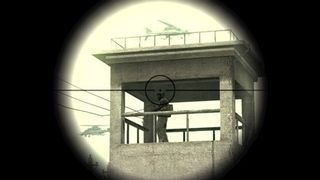After leaving the palace, and being teasingly introduced to the Beauty and the Beast boss characters - who brutally decimate a militia army - this thread of the story ends with Snake trying to assassinate Liquid in a cut-scene, but failing when he’s incapacitated by a mysterious siren, causing everyone, bar Akiba, to stumble and foam at the mouth. “Brother!” heralds Liquid. “Rejoice! We’re not copies of our father after all… we are free!” Snake’s vision blacks out, to see Naomi at his feet, who injects herself, and drops the needle. “If you won’t be a prisoner to fate… go… fulfill your destiny,” she teases. Choppers take Liquid and Naomi away, as Akiba rouses Snake in the final seconds of the game’s first act. Without giving too much away, the Middle East level takes hours, during which time we tripped 47 alerts, killed 95 soldiers, obtained 18 weapons, used 16 recover vitamins and watched 13 flashbacks.
That’s the last piece of in-game action we’ll share for fear of spoilers - but if you watch the previous trailers with eagle eyes, and freeze frame, you can deduce where the game goes next. Kojima’s made no secret of MGS4 being like James Bond, with Snake traveling all over the world. It’s also well established that the game contains five major locations - including the Middle East, South America and East Europe. The remaining locations can’t be revealed, but fans could make some educated guesses. Having finished MGS4, we can only recommend you watch the trailers again - but even then, the game’s pregnant with hugely unexpected surprises. Not everything in the trailers is in the game as it stands, but, but… let’s just say, Kojima isn’t inthe business of disappointment.
Is MGS4 as good as we hoped? In a huge number of places, it’s better. Some sections redefine the limits of interactive cinematography, with bravura changes of pace. It’s rammed with surprises, and finishing it is only the start. MGS4’s only ‘problem’ - and we’re as guilty as anyone - is its startling level of expectation, as a PS3 exclusive and, arguably, the most important next-gen game to date. Our base level of expectation was that it would be The Best Game Ever, with anything above that a bonus - a ludicrously high level of expectation, but such is Kojima’s pedigree, and the fierce level of devotion MGS inspires in the most austere of critics.

As it stands, don’t expect perfection - nothing this ambitious, or heartfelt, is - certain elements could be more clearly flagged, Kojima could self-edit more ruthlessly and the controls are still fiddly, if incredibly deep. But it’s an unprecedented achievement that you could spend months eulogising about in terms of unique moments, despite technical imperfections. That’s how Metal Gear has always been - an intensely personal game,created with singular vision, not the bland, cold hand of focus groups that delete anything considered ‘edgy,’ ‘challenging’ or ‘obtuse.’
It’s a game of contradictions, as fiddly as it isprecise, as genuinely funny as it is rambling, as beautiful as it is, at times, functional. There’s something to delight - and frustrate - everyone, from newcomer to veteran, a welcome relief from the sea of bland, demographic pandering shooters that placate myopic shareholders, but inspire devotion in precisely nobody. In short, it’s a rallying point for hardcore gamers - or rather, anyone who thinks games have the potential to be richer than any other media. It’s a Hollywood blockbuster and obscure indie flick rolled into one seething, imperfect, unmatched river of entertainment. And, er, it’s not even quite finished, so might be even better than the version we played.
Ten years on from Metal Gear Solid on PS1, MGS4 feels like Kojima coming full circle, having previously insisted this would be his last Metal Gear game - a claim neither repeated nor denied during our time with him. “I want people to look back on themselves, to reflect on what has happened in between, and how you have aged,” claims Kojima. In that respect, MGS4 is a humbling, almost poignant success. The truth is it makes MGS look like a crude artifact from an ancient age, echoing Kojima’s theme about the thrill, and dangers of technological acceleration. In that context, two months is hardly that long to wait for the most anticipated next-gen game yet. When the game’s finally available for review, you can rest assured that no one will have played it more - handy, because when you’ve completed it, our real conversations about the staggering depth, and achievement, of MGS4 can begin.
Apr 8, 2008
Sign up to the 12DOVE Newsletter
Weekly digests, tales from the communities you love, and more

Metal Gear Solid's former art director once said he spends "a lot of time fussing over the details of the characters' backside since that's the side the player sees most in-game"

In 1997, Hideo Kojima said the "one thing" he wanted to avoid in Metal Gear Solid was "tedious" cutscenes with characters "blabbering at each other for 4 or 5 minutes"
Most Popular



